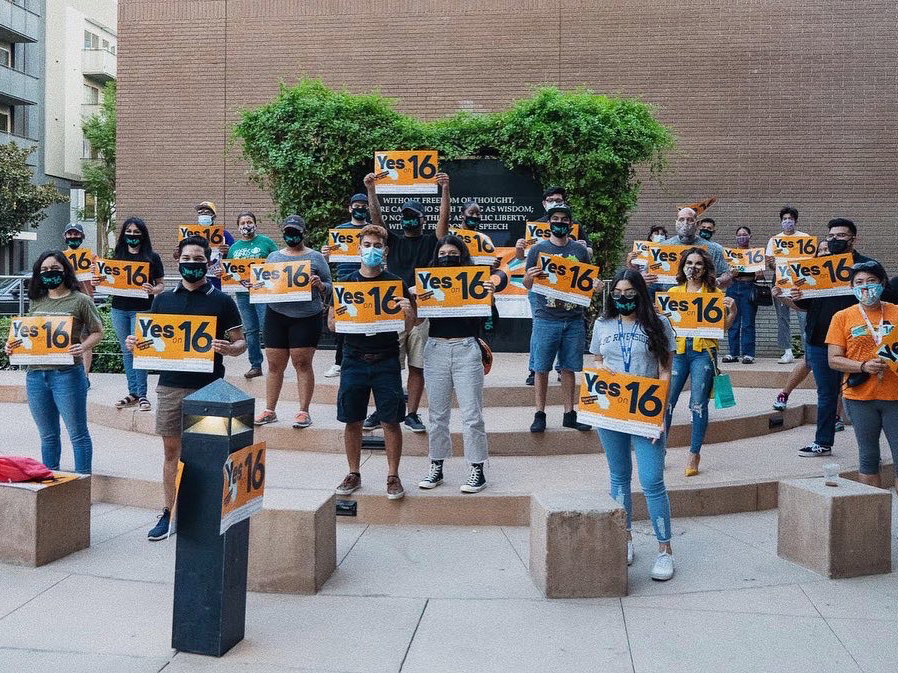
Although there were many promising pieces of legislation on the California ballot, progress stagnated this year. Disappointingly, Californians failed to recognize the importance of voting for policies in their own state rather than just the presidency. Consequently, crucial legislation such as Proposition 16 failed to pass, which will create a significant hurdle that students of color will have to overcome in college admissions.
Proposition 16 could have created equity among different communities, and this would have been accomplished by repealing the Proposition 209 Affirmative Action Amendment (1996), which was passed in order to ban preferential treatment based on race, color or sex in public employment and public education. With this amendment in place, communities of color would not be able to compete with their white counterparts when it comes to advancing in society. Furthermore, a “yes” on Proposition 16 meant that public entities would have been allowed to use affirmative action programs and take race, place of origin, color or sex into consideration when hiring employees or admitting students. On the other hand, a “no” would keep Proposition 209 in place, creating a barrier for many people who are trying to access more opportunities. With Californians ignorantly voting against Proposition 16, they are depriving minorities of affirmative action programs and making it more difficult for disenfranchised students to pursue higher education.
The most plausible reason Proposition 16 failed to pass in California is that California is more conservative than it seems. In reality, California is only liberal when it comes to presidential elections. However, when it comes down to putting in real work by passing legislation, California voters tend to skew conservative. Most Democrats in California only pay attention to surface-level politics in contrast to their much older and traditional Republican counterparts, who are far more engaged in state politics than Democrats, which explains why less progressive policies have not been able to pass. Additionally, the ballot’s misleading and inaccessible language could have affected results, especially from voters who did not have the time to research what the passage of Proposition 16 would mean.
Failure to pass Proposition 16 will impact countless students’ lives when it comes to pursuing higher education. Proposition 16 would have helped students of color who may not have come from wealthier backgrounds. The impact this will have on schools in California will only cause more stress for first-generation students. In fact, educational institutions often use student leaders to represent different cultural communities and to develop outreach programs for the surrounding areas in order to provide better resources. However, it is unfair that the burden falls on these students because it puts pressure on them to reach out to these different communities. This would simply be too much to manage for a student, and Proposition 16 would have alleviated this amount of labor.
Affirmative action would have increased the budget schools have to reach out to underrepresented communities, and it would have allowed for more resources to go to people who would otherwise not have access to higher education. Without affirmative action, diversity on campuses will decrease, and many students of color will lose their chances to go to school. Without policies such as Proposition 16 that combat structural racism, communities without adequate resources will be unfairly put at a disadvantage.
Of course, there is the age-old argument that qualifications should be solely based on merit. However, this argument does not take into consideration the resources wealthier communities are given in contrast to underserved communities. For example, a wealthy white or Asian student from the suburbs can afford an immense amount of SAT and ACT prep in order to pass their exams, whereas some people of color from low-income communities do not have that same luxury and therefore might not do as well on exams. Arguing against affirmative action is refusing to recognize the large amount of inequity in the country. Unfortunately, we do not live in a world where everyone starts at the same point, and basing things off of merits alone would only work if there was equity across all communities, which there clearly is not.
People need to be more aware of the inequity that plagues communities in America. Qualifications based solely on merit are not something that can be easily done anymore, and it would be pure ignorance to believe that race does not play a large factor in determining someone’s future. Until equity is achieved and everyone can start at the same place, affirmative action needs to be kept in the forefront of everyone’s minds. Looking past the surface level of activism and actually paying attention to law and policy will go a long way in ensuring that more progressive legislation gets passed.







